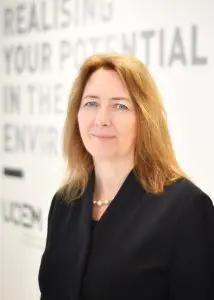‘More needs to be done to address gender imbalance around the world’: Guest article by UCEM Chair of the Board of Trustees, Amanda Clack
Posted on: 9 November, 2021
It’s jointly Gender Day and Science and Innovation Day at COP26 today. Continuing with our activity on the event, we asked UCEM’s Chair of the Board of Trustees, Amanda Clack, who is a prominent voice on diversity and inclusion, to share her thoughts on gender in relation to climate action.
Here are Amanda’s thoughts…

I love the fact that on Tuesday, ‘gender’ is linked with ‘science and innovation’ as we need to attract more female talent into the built environment and STEM [science, technology, engineering and mathematics]. Qualified surveyors still only account for 15% of the profession.
According to Statistics Times, the world population in 2021 is split 50.42% male and 49.58% female. Yet why then in the FTSE 100 are there only six female CEOs compared to 94 men? We need more women in senior leadership roles to influence decision-making around the table.
The built environment needs more women engaged within it, in order to be more representative of the communities it is there to serve; where all perspectives need to be represented.
Achieving the United Nations’s (UN) Sustainable Development Goals by 2030 will only happen if women’s equal participation and leadership in political and public life are achieved. Women remain underrepresented at all levels of decision-making worldwide, making achieving gender parity in political life not achievable until 2077 for women in executive government positions, and until 2063 for national legislative bodies, according to the UN. That’s simply not good enough and targets need to be set for change.
More needs to be done to address gender imbalance around the world, to get more women into decision-making positions, into STEM, and into the built environment.
We need more visible role models telling their stories to help inspire a whole generation to follow.
We have to change the dial more rapidly, especially where, in some countries, being female means you simply cannot own assets in land and property. Surely this can easily be changed if our global leaders are determined to make it happen.
With only 12.4% of decision-makers at US venture capital firms being women, 26 women serving as heads of state and/or government, and only 25% of parliamentarians around the world being female – when it comes to climate decisions that affect us all, we need a better gender balance represented in decision-makers, starting now.





